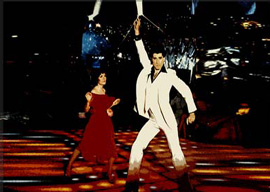
June 22, 2011

John Travolta in Saturday Night Fever
Well, to the extent that we can know who anybody on the Internet really is (as the hilarious “Gay Girl in Damascus” and “Lez Get Real” fiascos reminded us), blacks use Twitter about twice as much as others do. And because African-American culture is so homogeneous, black users’ hashtags (”#ghettobabynames Weavequisha”) often dominate the trending rankings.
Still, the current popularity of social media among the diverse should remind us of how much the earlier Internet (say, 1990 to 2005) was the golden age of white male Antisocial Media.
The first wave of the Internet liberated the “neurodiverse”: i.e., nerds, mostly white and male. For example, when the Democratic Kos Netroots started getting together, they were surprised to discover that, despite all the pro-diversity rhetoric they’d exchanged, they turned out to be a bunch of middle-aged white guys.
If you’ve ever observed a Wikipedia Editors Meetup, you can see why they don’t get together more often. Yet Wikipedia is a monument to what disproportionately white male homebodies can build.
The antisocial media allowed geeks who were obsessed with a particular topic to absorb and transmit vast amounts of information to similar geeks, all without having to interact face-to-face. Perhaps the most insightful post-9/11 pundit was the War Nerd (a k a Gary Brecher/John Dolan), an itinerant English professor who had taught himself a vast amount about fighting wars in the Third World (especially the key lesson—don’t).
Or consider the career of the most popular sports pundit to emerge from the online era, Bill Simmons. He has a relatively functional personality, but he revolutionized sportswriting by adopting the nerds’ virtual approach to data-amassing. Traditionally, a newspaper’s baseball beat writer would laboriously follow the local team around the country, watch each game from the stadium press box, then trudge down to the locker room to ask tonight’s hero what kind of pitch he hit for a home run. To Simmons, that seemed like a ridiculously low-bandwidth way to analyze sports. Instead, he stayed home and watched four televisions at once.
In contrast, the social-network era of, say, 2005 onward has seen the Revenge of Normal People. Twitter is restricted to 140 characters, a length that us nerdy straight white guys find absurd. How can anybody say anything that is true, new, important, and interesting in 140 characters?
But most people don’t care about saying things like that. They just want to say whatever is on their minds at the moment. They have a life.